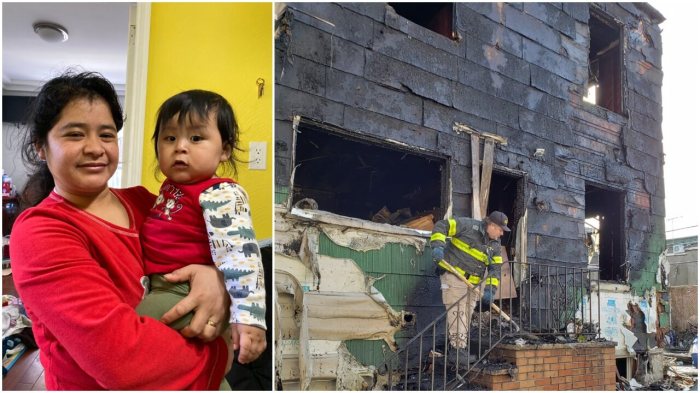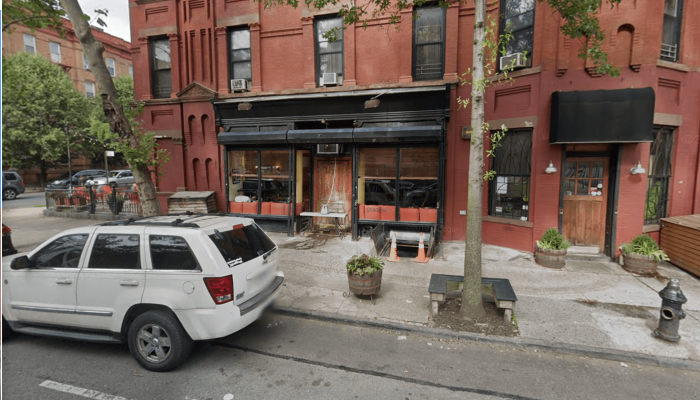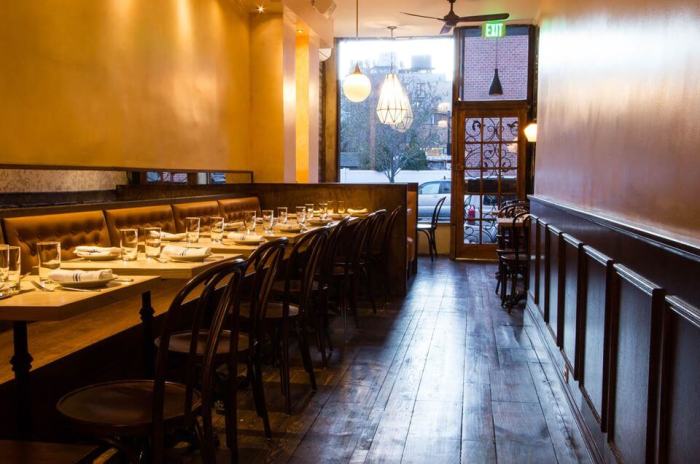Five food delivery workers have died on the job in Brooklyn over the past year, with the most recent just over two weeks ago, according to a scathing new report by the delivery workers collective Los Deliveristas Unidos that details the harrowing working conditions that those who deliver food to New Yorkers are faced to endure.
Los Deliveristas say the report, a joint effort of the Workers’ Justice Project (of which Los Deliveristas are a part) and Cornell University’s IRL School, is the “first of its kind” to comprehensively document the state of the gig economy for food delivery workers, who number at about 65,000 citywide.
The authors surveyed 500 app-based delivery workers in New York City, conducted focus groups, and interviewed delivery workers individually to accrue their findings, released Sept. 14.
The largely-immigrant deliverista workforce were deemed essential workers at the height of the COVID-19 pandemic, delivering food to millions of people during the lockdown. Despite that status, however, deliveristas are some of the most precariously placed workers in the city, toiling for minuscule pay with no benefits and few labor protections, covering their own expenses, facing exploitation from the tech giants controlling delivery platforms, and often working in dangerous conditions.
Those killed in the line of duty in the borough, as named in the report, were: Juan Tiu-Caxaj, 22, killed in East New York on Nov. 7, 2020, Adrian Coyotl Santos, 33, killed in Williamsburg on Dec. 23, 2020, Luis Alvaro Hernandez, 24, killed in Flatbush on April 24, Federico Zaput Palax, 27, killed in Kensington on July 22, and Tarek Aziz, killed in East New York on Aug. 27. At least four were killed in collisions on the road (further information on Hernandez’s death was not immediately available).
Food couriers face, in various respects, a more difficult and precarious job working with delivery apps like Grubhub, Doordash, and Uber Eats than they did in the past, when delivery workers were usually directly employed by restaurants. They are now classified as independent contractors, even though 64 percent of deliveristas surveyed said they work at least six days per week, with 33 percent working seven days per week. As independent contractors, they are not covered by labor protections offered to full-time employees such as “minimum wage, overtime, workers compensation, social security, health & safety laws, or the right to form a union,” the report notes.
They often don’t make minimum wage, and rely on unreliable tips for a substantial portion of their income. Those surveyed reported an average hourly wage of $7.87 per hour excluding tips, which comprise 44 percent of their income, according to the report. That’s after covering the myriad of expenses which, as independent contractors, the deliveristas have to pay for themselves, including their own e-bikes which go for hundreds of dollars, maintenance and battery charging for their bikes, an unlimited cell phone plan, safety equipment, and even the app-branded bags that they carry the food in.
“All these expenses used to be covered by restaurants when delivery workers were direct restaurant employees,” the report reads.
They are also on the hook when things go awry, as they often do, even if they’re not at fault. A whopping 49 percent of respondents reported having been in a collision while on the job, and 75 percent of those respondents said they had to pay for their medical care out of their own pocket. Meanwhile, 54 percent of deliveristas reported having experienced bike theft, and 30 percent said they’d been assaulted while being robbed. Deliveristas are often offered incentives to make deliveries during dangerous storms, as during Hurricane Ida earlier this month.
Deliveristas also say that they face punishment from the apps for subpar performance, often related to poor customer reviews. Punishments can include seeing their ratings lowered in the app’s internal rating system, or even having their account suspended or terminated, issues for which they often have little recourse. The report gives an example of some customers who deliberately report their food as stolen in order to get a free meal, a practice that can result in termination for the delivery worker; as such, some deliveristas have started wearing body cameras.
Los Deliveristas are currently advocating for a package of bills in the City Council aimed at correcting some of the poor conditions listed in the report. The package includes measures requiring restaurants allow delivery workers access to bathrooms (83 percent of deliveristas surveyed said they’d been denied access to bathrooms), requiring apps to provide minimum payments per-trip, allowing delivery workers to set maximum limits on distance they’re willing to travel for work, and banning apps from charging fees to workers in order for them to get paid.
A spokesperson for Grubhub said the company is in support of the package.
Grubhub did not support a bill that recently passed requiring apps to share customer data with restaurants, the spokesperson said, and the company is currently suing the city with Doordash and Uber Eats over its cap on in-app fees.
A spokesperson for Doordash, meanwhile, pushed back on numerous points presented in the report.
“This study has questionable methodology and makes misleading claims directly contradicted by the facts,” the spokesperson said. “Nationally, Dashers earn over $25 per hour they’re on a delivery and Dashers earn $33 per hour they’re on a delivery in Manhattan. Dashers receive 100% of their tips, and on average, Dashers deliver for fewer than four hours per week, fitting delivery around full time jobs, caring for friends and family, going to school, and more.”
Asked to clarify the $33 per hour in Manhattan number, which a spokesperson for Los Deliveristas deemed misleading, the Doordash rep said that the number refers to the time period between when a worker accepts an order to when they deliver it, and that deliveristas can be doing other things between orders. The report notes that workers often face significant amounts of unwanted downtime between jobs.
The spokesperson also said that Doordash has launched several initiatives aimed at supporting its workforce, known internally as “Dashers.”
“In the last year, we’ve launched several industry-leading initiatives to support Dashers, including free and discounted bike safety gear, expanding access to e-bikes, identifying restrooms in hundreds of restaurants that Dashers can use when picking up an order, and providing Dashers with resources to reduce their expenses. We are actively engaged with the Dasher community and eager to engage with policymakers on ways all stakeholders can better support New York City delivery workers.”
The Doordash spokesperson also maintained that there were inconsistencies in the report, such as the way average pay was calculated (the report states at one point that the calculations are based on 160 hours worked per month, while the calculations themselves assume six-day workweeks), along with the fact that the sample was not random and included workers referred by others.
The spokesperson also said that Dashers can decline any order, the company removes ratings under 5-stars when the reason was out of the Dasher’s control, that the company has a “deactivation appeals process” in contrast to the claim of no due process, and that Dashers are eligible for federal occupational accident insurance coverage.
A spokesperson for Uber Eats did not respond to a request for comment.























